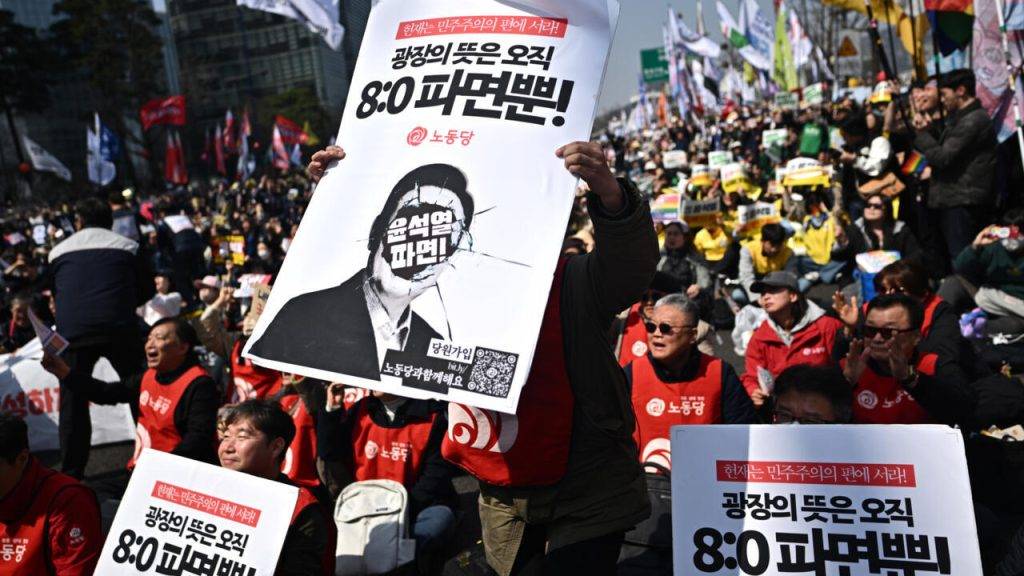Cliff Notes – South Korean court upholds impeachment of Yoon Suk Yeol
- South Korea’s Constitutional Court has upheld the impeachment of Yoon Suk Yeol, determining that his declaration of martial law breached constitutional protocols and impeded judicial independence.
- Following the unanimous verdict, Prime Minister Han Duck-soo will act as president while a new election must be held within 60 days to replace the impeached leader.
- The court’s decision has prompted strong reactions, with pro-impeachment supporters celebrating while Yoon’s advocates expressed anger, highlighting the deeply divided political landscape in the country.
South Korean court upholds impeachment of Yoon Suk Yeol
South Korea’s Constitutional Court upheld the impeachment of Yoon Suk Yeol on Friday, months after the ousted president’s declaration of martial law threw the country into chaos.
Yoon was not present in court to hear the verdict.
In a nationally televised unanimous verdict, the court’s acting chief Moon Hyung-bae said the eight-member bench upheld Yoon’s impeachment, finding that Yoon’s martial law declaration “violated” the constitution, did not not follow correct procedures and interfered with the independence of the judiciary.
The verdict also said Yoon violated his duty as commander-in-chief by mobilizing troops.
Yoon’s People Power Party said it accepted the court’s verdict.
“We extend our sincere apology to the people,” lawmaker Kwon Young-se said.
Jubilation and anger after verdict
Yoon supporters as well as pro-impeachment demonstrators camped outside the court overnight.
Ahead of the verdict, police raised the alert to the highest possible level, enabling the deployment of the entire force.
As the verdict was announced, thousands of supporters of his ouster erupted in cheers, with chants of “We won!” ringing out.
Meanwhile, Yoon’s supporters, gathered near his official residence, reacted with anger and dismay. According to Yonhap News Agency, one protester was arrested for breaking a police bus window.
Yoon Kap-keun, one of Yoon’s lawyers, labelled the ruling a “pure political decision.”
Why was the president arrested?
Yoon was arrested and charged by prosecutors in January over his December 3 decision to declare martial law and sending troops to parliament to prevent its repeal, a move that plunged the country into political turmoil.
South Korea’s opposition-led parliament subsequently voted to impeach Yoon in mid-December, leading to his suspension from office.
Following his impeachment, the 64-year-old resisted arrest for two weeks at his presidential compound in central Seoul.
Yoon has since defended the short-lived imposition of martial law as a “proclamation that the nation was facing an existential crisis.”
In March, Seoul’s Central District Court canceled Yoon’s arrest warrant, citing the timing of his indictment and “questions about the legality” of the investigation and freed him from prison.
What happens next?
Prime Minister Han Duck-soo will continue to serve as acting president until the new president is inaugurated.
South Korea must now elect a new president within the next 60 days.
He is the first sitting South Korean president to stand trial in a criminal case. The case is expected to drag on well past his impeachment.
Additional sources
South Korea’s ousted leader Yoon loses reckless gamble with martial law – Reuters
Potential arrest, no perks, pension: what comes next for South Korea’s Yoon? – South China Morning Post
Yoon Suk Yeol: The South Korean president who could be permanently impeached – Sky News
Who is Kim Keon-hee, described as South Korea’s ‘Lady Macbeth’? – Al Jazeera


